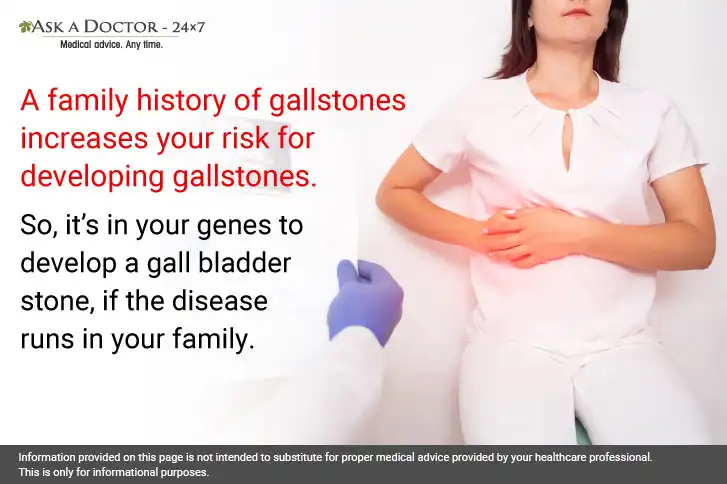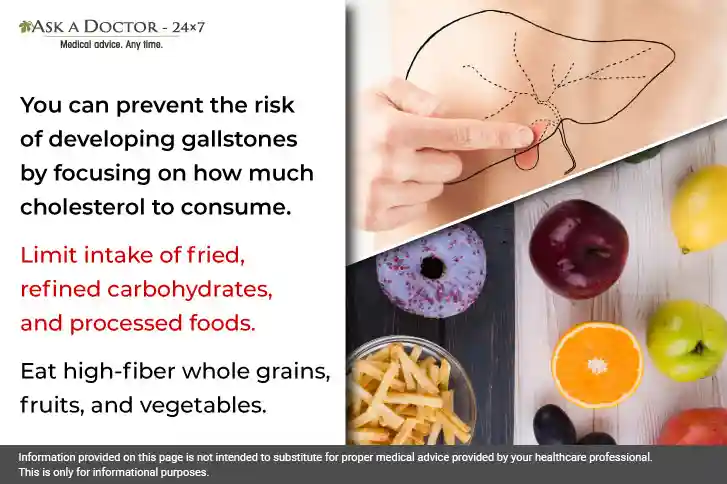Is It Just An Abdominal Pain Or Gallstones Pain?
Signs and Symptoms of Gallbladder Stone
- Pain in the upper middle abdomen.
- Pain has a radiating nature and might spread to the back or right shoulder.
- Pain can last for a few minutes to several hours.
- Pain recurs, mostly while eating or after meals.
- Dark-colored urine and light-colored poop.
- Yellowish discoloration of your skin or white of the eyes.
- Low-grade fever with chills.
- Associated digestive symptoms, such as nausea or vomiting.
Who is at Risk of Developing Gallstones?

- Family history of gallstones
- Gender-wise, females are more prone to stones than men
- Age-wise, anyone over 40 years old
- Being overweight or obese
- Sudden weight loss
- Regular consumption of high fat, cholesterol, and low in fiber diet
- People with diabetes
- People with blood disorders, such as sickle cell disease
How Do Gallstones are Caused?
Our liver continually makes bile - a liquid that aids in digestion,
which gets stored in the gallbladder. It is only when we consume food, the
stomach releases a hormone that causes the muscles around the gallbladder to
contract and release the bile to help break down the consumed fat to digest.
Bile is made up of several substances, including
cholesterol, bile salts, and water and at times some of these substances stick together
to form gallstones ranging in size from that of a grain of sand to a golf ball.
When these gallstones get stuck while traveling through the
duct (tube) to the stomach, they block the outflow of bile and inflate the
gallbladder. When we consume any food, our gallbladder contracts and as a
result leads to sudden, sharp, pain, under the rib cage in the upper right side
or center of the abdomen.
How to Diagnose Gallbladder Stone?
- Blood tests
- Ultrasound
- X-ray
- Computed tomography (CT) scan
- Cholescintigraphy, an imaging approach that involves injecting small amounts of radioactive material into the blood
- Endoscopic retrograde cholangiopancreatography (ERCP), a type of imaging that helps locate where gallstones are blocking bile ducts
- Magnetic resonance imaging (MRI)
Treatment for Gallstones
Dietary Modifications to Prevent Gallbladder Stones

- Food that is high in trans-fat and unhealthy fats
- Processed foods
- Simple carbohydrates like white sugar and bread
- Plenty of fruits and vegetables
- Low-fat dairy and leafy greens
- Foods rich in antioxidants and Vitamin C
- Plant-based protein like tofu, beans, and lentils
- Healthy fats from nuts and fish
- Black, unsweetened coffee
Recently Answered Questions Related To Gallbladder Stones and Associated Problems
- What Causes Continued Pain After Gallbladder Is Removed?
- What Is The Difference Between Gallstones And Polyps In Gallbladder Ultrasound Test?
- Why Am I Having A Bubbling Feeling In The Gallbladder Area Even Though I Don't Have A Gallbladder?
- How To Remove Gallstones Without Surgery?
- Is There Any Way To Save The Gallbladder Without Going For Removal?
- What Causes Inflammation In The Gallbladder?
- Why My Gallbladder Needed Removal Surgery?
- Is Surgical Removal Of Gallbladder Stones Safe After A Hysterectomy?
- Is Gallbladder Removal Surgery Advisable While Suffering From UTI?


